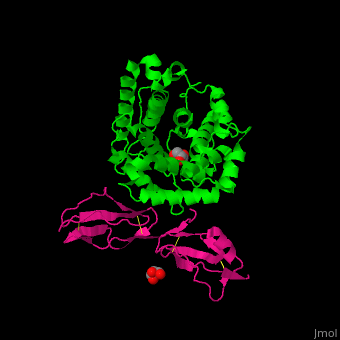Complement factor: Difference between revisions
Jump to navigation
Jump to search
Michal Harel (talk | contribs) New page: <StructureSection load='3oxu' size='340' side='right' caption='Structure of human complement factor H 19-20 sushi domains complex with complement C3 (PDB code 3oxu).' scene=''> == Fu... |
Michal Harel (talk | contribs) No edit summary |
||
| (19 intermediate revisions by 3 users not shown) | |||
| Line 1: | Line 1: | ||
<StructureSection load='3oxu' size='340' side='right' caption='Structure of human complement factor H 19-20 sushi domains (magenta) complex with complement C3 (green) and glycerol (PDB code [[3oxu]]).' scene='59/594535/Cv/1'> | |||
<StructureSection load='3oxu' size='340' side='right' caption='Structure of human complement factor H 19-20 sushi domains complex with complement C3 (PDB code [[3oxu]]).' scene=''> | |||
== Function == | == Function == | ||
'''Complement factor H''' (CFH) regulates the complement system which is part of the immune response. CFH protects cells by preventing the activation of the complement system when it is not needed. CFH contains 20 short consensus repeats (sushi domains). | *'''Complement factor H''' (CFH) regulates the complement system which is part of the immune response. CFH protects cells by preventing the activation of the complement system when it is not needed. CFH contains 20 short consensus repeats (sushi domains, i.e., a 5 strand β-sandwich arrangement)<ref>PMID:15163532</ref>. | ||
*'''Complement factor D''' (CFD) and '''Complement factor B''' (CFB) regulate a key step in the activation of the alternative complement pathway. CFD is a member of the chymotrypsin family of serine proteases. | |||
*'''Complement factor I''' (CFI) is a serum protease that inhibits all complement pathways. | |||
*'''Complement factor P''' (CFP) is a positive regulator of the alternative complement pathway<ref>PMID:28480349</ref>. | |||
== Disease == | == Disease == | ||
CFH mutations are involved in dense deposit disease, age-related macular degeneration, atypical hemolytic-uremic syndrome and the kidney disorder glomerulonephritis. | CFH mutations are involved in dense deposit disease, age-related macular degeneration, atypical hemolytic-uremic syndrome, schizophrenia, stroke and the kidney disorder glomerulonephritis. CFD and CFI are implicated in age-related macular degeneration<ref>PMID:22003108</ref>, <ref>PMID:25352734</ref>. | ||
== Relevance == | == Relevance == | ||
CFH is recruited by human pathogens resulting in increased virulence. CFB is a novel target for treatment of cardiometabolic disease<ref>PMID:28739975</ref>. | |||
== Structural highlights == | == Structural highlights == | ||
= | The <scene name='59/594535/Cv/5'>sushi domains are ca. 60 amino acid long containing 2 Cys-Cys bonds</scene>. | ||
*<scene name='59/594535/Cv/6'>Cys-Cys bonds</scene>. | |||
==3D structures of complement factor== | |||
[[Complement factor 3D structures]] | |||
</StructureSection> | |||
== References == | == References == | ||
Latest revision as of 10:05, 6 June 2024
Function
DiseaseCFH mutations are involved in dense deposit disease, age-related macular degeneration, atypical hemolytic-uremic syndrome, schizophrenia, stroke and the kidney disorder glomerulonephritis. CFD and CFI are implicated in age-related macular degeneration[3], [4]. RelevanceCFH is recruited by human pathogens resulting in increased virulence. CFB is a novel target for treatment of cardiometabolic disease[5]. Structural highlightsThe .
3D structures of complement factorComplement factor 3D structures
|
| ||||||||||
ReferencesReferences
- ↑ Rodriguez de Cordoba S, Esparza-Gordillo J, Goicoechea de Jorge E, Lopez-Trascasa M, Sanchez-Corral P. The human complement factor H: functional roles, genetic variations and disease associations. Mol Immunol. 2004 Jun;41(4):355-67. PMID:15163532 doi:10.1016/j.molimm.2004.02.005
- ↑ Narni-Mancinelli E, Gauthier L, Baratin M, Guia S, Fenis A, Deghmane AE, Rossi B, Fourquet P, Escaliere B, Kerdiles YM, Ugolini S, Taha MK, Vivier E. Complement factor P is a ligand for the natural killer cell-activating receptor NKp46. Sci Immunol. 2017 Apr 28;2(10). doi: 10.1126/sciimmunol.aam9628. PMID:28480349 doi:http://dx.doi.org/10.1126/sciimmunol.aam9628
- ↑ Stanton CM, Yates JR, den Hollander AI, Seddon JM, Swaroop A, Stambolian D, Fauser S, Hoyng C, Yu Y, Atsuhiro K, Branham K, Othman M, Chen W, Kortvely E, Chalmers K, Hayward C, Moore AT, Dhillon B, Ueffing M, Wright AF. Complement factor D in age-related macular degeneration. Invest Ophthalmol Vis Sci. 2011 Nov 11;52(12):8828-34. doi: 10.1167/iovs.11-7933. PMID:22003108 doi:http://dx.doi.org/10.1167/iovs.11-7933
- ↑ Alexander P, Gibson J, Cree AJ, Ennis S, Lotery AJ. Complement factor I and age-related macular degeneration. Mol Vis. 2014 Sep 13;20:1253-7. eCollection 2014. PMID:25352734
- ↑ Coan PM, Barrier M, Alfazema N, Carter RN, Marion de Proce S, Dopico XC, Garcia Diaz A, Thomson A, Jackson-Jones LH, Moyon B, Webster Z, Ross D, Moss J, Arends MJ, Morton NM, Aitman TJ. Complement Factor B Is a Determinant of Both Metabolic and Cardiovascular Features of Metabolic Syndrome. Hypertension. 2017 Jul 24. pii: HYPERTENSIONAHA.117.09242. doi:, 10.1161/HYPERTENSIONAHA.117.09242. PMID:28739975 doi:http://dx.doi.org/10.1161/HYPERTENSIONAHA.117.09242
